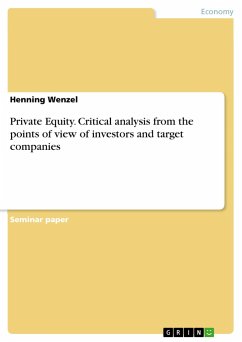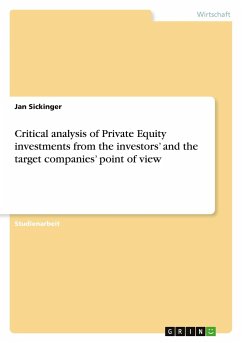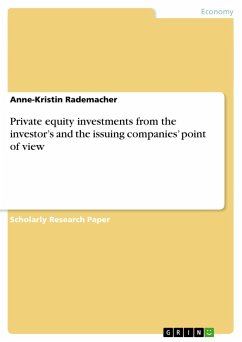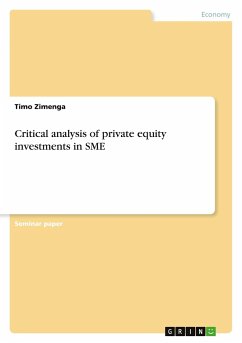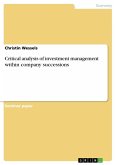Seminar paper from the year 2013 in the subject Business economics - Investment and Finance, grade: 1,7, University of applied sciences, Cologne, course: International Investment & Controlling, language: English, abstract: Private Equity plays an increasingly important role in the financing of a wide range of businesses. Over the past 20 years, private equity has been on of the fastest growing markets for corporate finance. One of the reasons the private equity industry exist is that, in many cases, companies have needs for capital which, for various reasons, cannot be met from the public markets. Investors that provide capital to private equity funds invest in an asset class that entails relatively high-risk and high illiquidity in what remains a largely unregulated market. Planning how to exit an investment is just as important as preparing to make one because a merger adds value only if synergy, better management, or other changes make the two firms worth more together than apart. The target companies are supported with accountants, lawyers, investment bankers and other specialists. Especially Start-up companies are often characterised by negative cash flows and demand high investments. PE gives the chance to reduce the financial gap between selffinancing and stock exchange listing and can also help to improve the equity ratio. Another advantage of PE for target companies is the increase of equity and an improved balance sheet structure. Regarding to that, the negotiating position is strengthened towards creditors, the credit rating is improved and the financial room for investments increases. The main disadvantage of PE for target companies is the weakened influence of the initial shareholders. Especially different strategically views between those two groups might be difficult to solve. Due to the fact of the high risk, from the investors' perspective, PE is a very interesting form of investment. Especially under diversification aspects the investment in PE funds make sense, because the investors offer investment opportunities that can not be replicated in the financial market and on top of that have a low correlation with other asset class. The firms standard practice of buying businesses and then, after steering them through a transition of rapid performance improvement and selling them is at the core of private equity's success.
Hinweis: Dieser Artikel kann nur an eine deutsche Lieferadresse ausgeliefert werden.
Hinweis: Dieser Artikel kann nur an eine deutsche Lieferadresse ausgeliefert werden.

